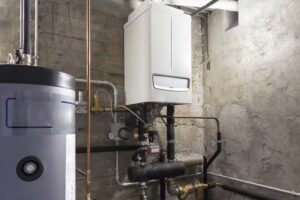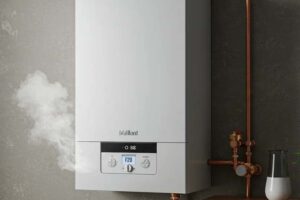Table of Contents
Households in the UK who are thinking about replacing their gas boiler with electric heat pumps could see one that is already in use in their area to see how it works.
Air-source heat pump technology has existed for a while, but it has only recently become one of the best ways to heat your home with green energy. Heat pumps take in heat from the air outside, which can then be used to heat radiators, baseboard heating, or hot water tanks. The best way to explain this technology is to say that heat pumps use air to make things cold.
The heat pump needs electricity to work. The SCOP stands for “Seasonal Coefficient of Performance,” which measures how much heat energy is produced per kW of power. In this case, a SCOP of 3.2 means that 3.2kW of electricity is generated for every 1kW of electricity used.
Since the air source heat pump gets its power from the air around it, its efficiency drops when the air temperature drops. There is less efficiency when there is a big difference between the outside air temperature and the goal temperature, which could be room temperature or hot water for the home. Because of this, it is important to know the property’s heat load and how well the heat pump performs.
If you want to heat a room, air-source heat pumps work best with baseboard heating. Radiators will also work.
A new service from the innovation charity Nesta has been launched to help people who want to buy a heat pump and schedule a visit with a home that already has one.
At the moment, the most heat pump hosts are in London and central Scotland. According to Nesta, East Anglia is “becoming a heat pump hotspot,” with 11 hosts advertising on the platform so far.
| A director at Nesta named Katy King said that the service would make it easy for people who want to buy a heat pump to see how it works in real life and ask any questions they may have.
“We hope that if more people can see heat pumps in real-life settings, then more people will have confidence that a heat pump is the right fit to heat their home,” She said;
“Changing how we heat our homes is one of the most meaningful things we can do to cut carbon emissions. Many homeowners are keen to make green improvements but don’t get the opportunity to see how low-carbon technologies, such as heat pumps, work in action.” |
Heat pumps are a key tool that the government sees as necessary to cut carbon emissions from heating, which account for more than a third of all greenhouse gas emissions in the UK.
Their goal is to install 600,000 pumps every year by 2028, but the new technology is expensive, and some people don’t trust it, making it hard to get started. To help bring down the costs to a level more like regular gas boilers, the government has raised the grant programme to £7,500.
| Martin Callanan, the minister for energy efficiency and green finance, said:
“This fantastic new service will help families work out whether a heat pump is right for them, and we’ll continue supporting households to make the switch with our £7,500 grant. We already know that heat pumps are three times more efficient than gas boilers, and demand is soaring, with applications to our boiler upgrade scheme up 75% last February,” he said. |



